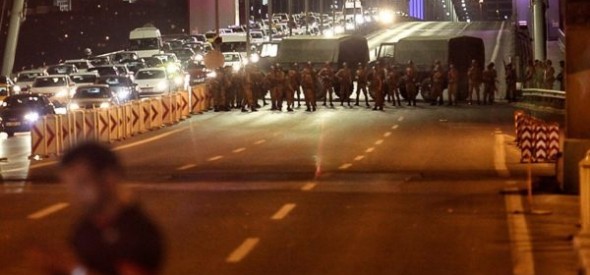The Dangers of Knowledge by Authority
0August 22, 2016 by leohowu

For the full month of July this year, I spent my time at the University of Toronto, attending the law portion of the Youth Summer Program there. Around half-way through the program, on July 15th, a faction of the Turkish Armed Forces attempted a coup d’état, in a bid to oust President Erdogan. As there was quite a moderate amount of Turkish students attending the program, it was no surprise that the news struck them with shock; they spent their whole night watching the coup attempt unravel on live stream Turkish television. As many of the new outlets from the West initially purported, the coup was a failed attempt at seizing power from the democratically elected Erdogan, and as a result many civilian lives were lost in the firefight. However, all the Turkish students that I talked to claimed the coup was a false flag operation by Erdogan, in order to increase his power through purging the armed forces and judiciary. Additionally, many of the news outlets had emphasized how Erdogan had been elected through a democratic process, whereas the Turkish students dismissed Erdogan as a corrupt “neo-Ottoman”.
The claim was initially shocking; however, in the following days it proved an interesting point. What some of the Western media was chugging out ran counter to what the students from Turkey were saying. For many residing out of Turkey, with limited exposure to Turkish politics, the large news outlets were the only source of information, and interestingly, the information millions of people would be absorbing was different from what many Turkish people believed.
How? Well, for many people, the primary sources of knowledge are figures of authority – professors, parents, news outlets, politicians, and so forth. So what is the role of authority in the acquirement of knowledge? When we acquire knowledge, we search for valid, reliable sources, in a quest of inquiry. In the AoK of history for example, inquiries are often made pertaining to cause-and-effect relationships between different events, such as the Treaty of Versaille and the start of World War II. Naturally, we look to historians, professors, and publications as authorities on said subject, because their knowledge is deemed as valid and reliable.
In this way, we can see how authority and the WoK of faith are instrumental in the acquirement of knowledge. As individuals, we do not have the time or resources to examine and learn everything ourselves through sense perception; we rely on primary and secondary-sources as authorities to the subject we wish to study. In ‘agreeing’ to study a certain source, we put faith into it as well as its author, trusting that the source/ author will provide truthful information.
However, the fact that most of our knowledge that is acquired through the study of sources that we have faith in means that we are highly vulnerable to manipulation. For example, in pre-1970s, staunchly anti-communist America, Mainland China was constantly portrayed as a malnourished, decrepit country ruled under an authoritarian regime. This all changed with the period of détente between the two nations, and in the 1970s, when the first film crews, journalists, and citizens allowed in; Americans saw a glimpse of a large, bountiful country. For decades, Americans had put faith in the government, news outlets, and experts from prestigious universities, and in turn, these parties had passed on their altered version of knowledge. Being the authority on the subject means that one has the liberty to ‘filter’ the language used to transmit knowledge, according to his or her own agenda.
As receivers of knowledge, we have the ability to be selective with our choice of ‘knowledge authorities’, through the WoK of reason. So what role does reason play in the clarification of ‘knowledge authorities’? When we receive knowledge, we interpret it through our own specific lens, and we use reason to determine its validity; we observe the different factors, such as the source of the knowledge, the source’s affiliations, the source’s experience, and so on, and we determine through reason, how rational the sources are.
Despite putting our faith in authorities of knowledge, and continuing to put our faith in them through reason, we can never be too certain of their authenticity. The two opposing views of the Turkish coup serve as a great example. On one hand, we have a trusted news corporation, with experts and observant in Turkey itself, as well as political experts back home. On the other hand, we have primary witnesses who live under the specter of Turkish political turmoil. Although on one end we have a certified, professional authority, and on the other we have an authority with in-depth context and understanding, we can’t be absolutely sure which side to put our faith in, despite our reasoning.
Category Leo | Tags:
Leave a Reply